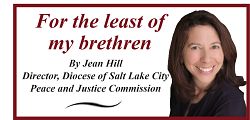For Labor Day, Consider the Dignity of Work
It is a little-known fact that many people experiencing homelessness have regular employment. Of course, most of those jobs pay minimum wage or slightly above – jobs that do not pay enough to afford the necessity of housing, not to mention food, transportation and health care.
Far too often, the response to this reality is something along the lines of “get a better-paying job.” But without stable housing, how does someone attend school or enter an unpaid training program to get a better job? Perhaps more importantly, why shouldn’t those we recognized as essential workers during the past year of pandemic shutdowns, homeless, on the brink, or scraping by, make enough money to live on? If grocery store clerks, food service personnel, assisted living workers, cleaning staffs and others had to work during the pandemic so the rest of us could access basics and stay safe, shouldn’t those persons also be able to access those basic requirements for a life of dignity? Shouldn’t wages work?
Catholic teaching says yes. We are a faith that believes strongly in the dignity of work. Any work, in our view, should provide an opportunity for the worker to reach his or her full potential, whether that is their potential as a friendly and professional frontline worker at a fast-food establishment or as a caring, skilled provider for the elderly; or an efficient and effective office, house or hotel cleaner; or receptionist, businessperson or doctor. It is not the degree required or the salary paid that give work dignity, it is the work itself.
Throughout the decades, our popes have reiterated this teaching. From Pope Leo XIII in 1891 to Pope Francis in the present day, our Church has taught that the economy exists for the person, not the other way around, and employers and employees owe certain duties to one another. For the employee, those duties include diligently completing their work with honesty and integrity. For employers, the duty is to provide safe working conditions, just wages and, as Pope Leo warned, to be mindful that “to exercise pressure upon the indigent and the destitute for the sake of gain, and to gather one’s profit out of the need of another, is condemned by all laws, human and divine.”
Sadly, human and divine condemnation has not curbed the exploitation of workers, whether it is undocumented workers in the United States, victims of labor trafficking worldwide, or through unsafe working conditions or quotas increasingly built into standard business practices. Catholic teaching envisions a better place for workers and their employers. A place of mutual respect and trust. A place where workers know their work is valued fairly both economically and morally and where employers know their employees are equally invested in the business’ success. We envision a workplace where the people in the corner office and those sweeping the corners are treated with equal dignity and have opportunities to grow and be recognized for their talents.
This isn’t a utopian dream, it is how a just and robust economy should work, if we are starting from that Catholic idea that the focus in our economy should be human development. Economic growth is good, but not if it comes at the expense of its workers.
As we remember workers on Labor Day, and celebrate the Year of St. Joseph, may we all see Christ in our fellow workers, treating them with the dignity they deserve, and see our work through the eyes of faith, recognizing in it our share in God’s creative activity.
Jean Hill is director of the Diocese of Salt Lake City’s Office of Life, Justice and Peace. Contact her at jean.hill@dioslc.org.
© Copyright 2024 The Diocese of Salt Lake City. All rights reserved.


Stay Connected With Us